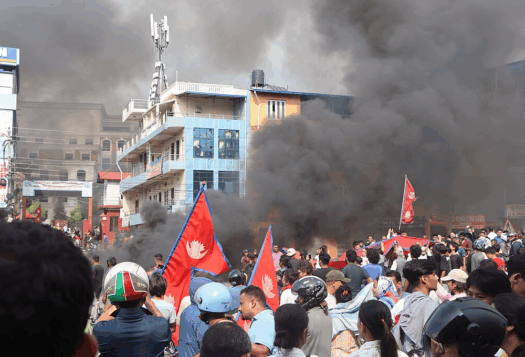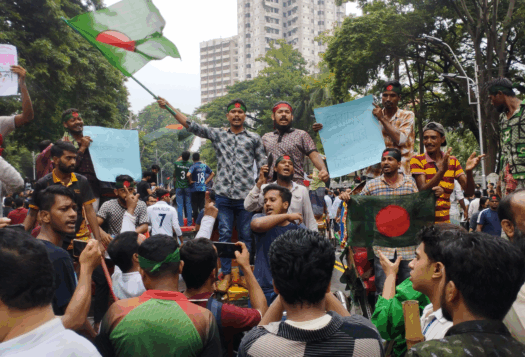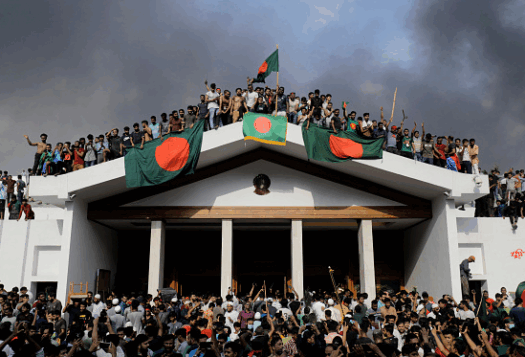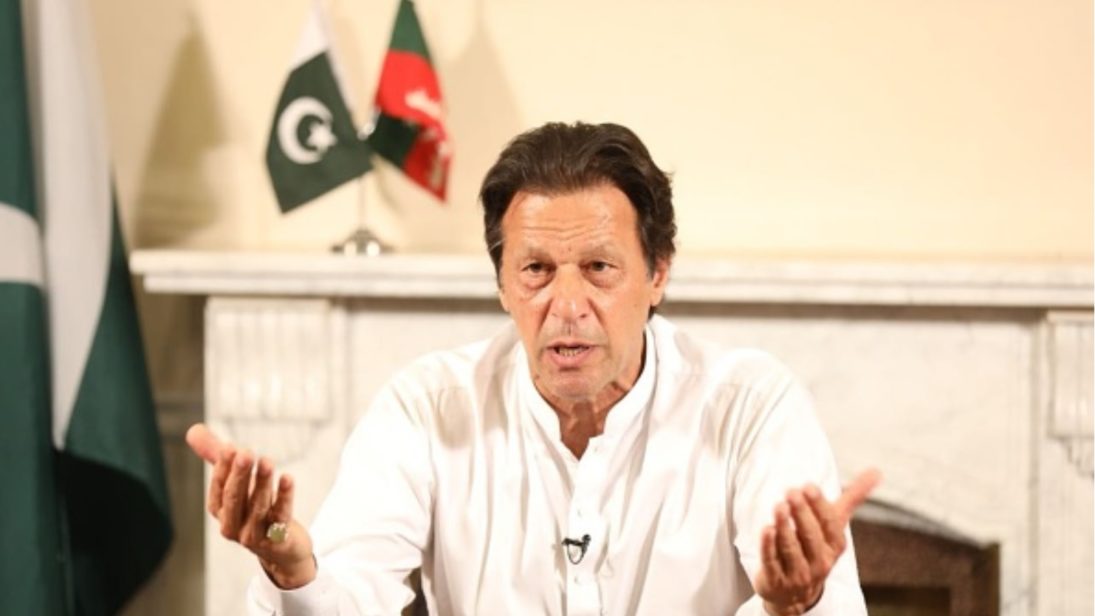
In a bid to topple the Pakistan Tehreek-e-Insaf (PTI) government in Pakistan, the Chief of Jamiat Ulema-e-Islam-Fazl (JUI-F) Fazlur Rehman has launched an Azadi (freedom) March from Karachi to Islamabad. The march has a single declared objective: Imran Khan’s resignation as prime minister and thereafter, a re-election. A shrewd, extreme-right senior politician, Rehman has long been a harsh critic of Imran Khan. After losing his seat in the 2018 election—a major upset—Rehman immediately rejected the election results and asserted that the PTI government was “selected by the establishment.” In protest of the alleged electoral rigging in the 2018 elections and the PTI’s poor performance on economic issues, Rehman mobilized large marches in major cities of Pakistan earlier this year, where he announced that he would spearhead an Azadi March in October if the government did not resign by August. As the date neared, the government attempted to engage Rehman in talks. The government’s negotiating team met with the joint opposition’s Rehbar Committee, but did not manage to dissuade them from holding the protest.
When the Azadi March finally entered Islamabad on November 1, it mobilized a sit-in just a few kilometers away from the Red Zone – the area in the federal capital housing the Parliament, the Supreme Court, the diplomatic enclave, foreign embassies, and other executive buildings. Owing to his strong religious following and the support of all major opposition parties, Rehman has been successful in congregating tens of thousands of protestors. While this march does not pose an immediate threat to Khan’s government, the security of Islamabad is clearly at stake. The challenge for Khan is to both maintain law and order and to assert the civilian government’s legitimacy in the process. The PTI government must adopt a flexible posture, employ sensible rhetoric, and not resort to using violence against its own citizens. The protest could prove to be a blessing in disguise if the government succeeds in communicating its power without using it, gaining an upper hand over the opposition parties questioning its ability to govern effectively.
Fazlur Rehman: A Political Pragmatist
The PTI government must adopt a flexible posture, employ sensible rhetoric, and not resort to using violence against its own citizens. The protest could prove to be a blessing in disguise if the government succeeds in communicating its power without using it, gaining an upper hand over the opposition parties questioning its ability to govern effectively.
Before it attempts to cut an effective deal with Rehman, the government must understand his political background and decipher the nuances of his demands and mobilization strategies. Rehman is an experienced player of the Pakistani political game. While his party has been unable to win more than a few seats in general elections, his tactics and astuteness have enabled him to remain in powerful positions irrespective of the party in government. JUI-F won only nine seats out of 271 general seats in the 2013 elections but the government nonetheless gave Rehman the status of federal minister. Earlier, in the 2008 elections, JUI-F had joined forces with other religious parties to found the Muttahida Majlis-e-Amal (MMA). Though his party held only 12 seats in the National Assembly, Rehman was selected as the chairman of the Kashmir committee.
Personal political interests also underpin Rehman’s decision to hold the anti-government march. Capitalizing on the division among opposition parties and their inability to stand against the PTI, he is able to present himself as the central node of all opposition stances. This way, he has strengthened his position within the opposition, ensuring that no movement against the PTI in the future would exclude him.
In addition, what the PTI government would do well to keep in mind is that in his efforts to subvert the PTI’s stance, Rehman is employing rhetoric and staging protests in a manner that directly parallels the 2014 PTI-led sit-in in Islamabad D-Chowk, at which Khan’s party charged the Pakistan Muslim League-Nawaz (PML-N) with election rigging. Thus, Rehman is attempting to turn the PTI’s historical stance on its head.
Like any skilled player of the political game, Rehman is taking strategic, incremental steps towards guaranteeing himself more time in the spotlight and may be trying to put the government in a position where it sees no option but to use force. After extending the deadline for Khan’s resignation, Rehman called an all-parties conference to determine the future course of the protest but no plan of action has been disclosed yet, mounting pressure on the government. Meanwhile, throughout this saga, Rehman and his followers have been giving the government implicit warnings—for instance, despite declaring that his movement will remain peaceful, Rehman has threatened the government with turning the country into a “battlefield.” Rehman also declared the agreement between his party and the PTI government—for JUI-F to keep its protest away from the Red Zone— nullified, claiming the administration was not fulfilling promises laid out in the agreement. Thus, the signs seem to point towards instability and a potential breakdown in security in the capital in the coming days unless the PTI is able to rise to this challenge.
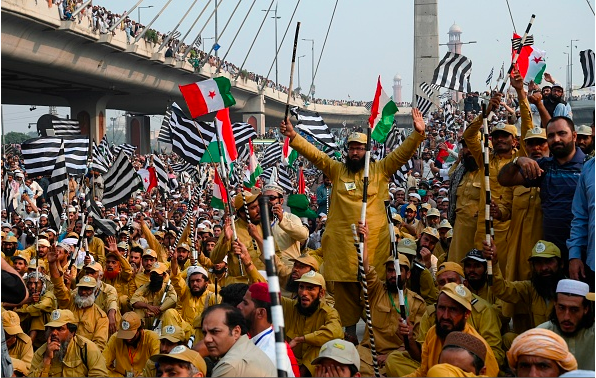
Fighting Pragmatism with Pragmatism: Strategy Options for the PTI
Responding to Rehman’s pragmatic maneuvering, Khan’s party must exhibit sense and rise above petty rhetoric. First, the PTI must remember it is in a stronger bargaining position, by virtue of constituting the democratically-elected seat of power. The opposition lacks the requisite cohesion, and the majority of the public does not agree with Rehman’s agenda of forcing the government’s resignation. Thus, the government has no reason to accept opposition demands for reelection.
Yet the PTI’s relative strength does not mean it can rob opposition parties of their democratic right to protest. Such a move would expose government weaknesses and play into the hands of opposition pressure tactics. Having staged a similar protest in the past, the PTI cannot come up with a strong anti-protest narrative. Allowing the protests to continue peacefully while maintaining strong administrative control would not only demonstrate the strength of the PTI government, but also solidify its democratic governing legitimacy.
The PTI’s relative strength does not mean it can rob opposition parties of their democratic right to protest. Such a move would expose government weaknesses and play into the hands of opposition pressure tactics.
Excess rigidity on the PTI’s part could push the opposition towards violence. If Rehman decides to make a move inside the Red Zone, just as the PTI protestors did in the past, the government could be tempted to turn to violent measures. Tear gas and baton charge on civilians is never a good sight: this could turn the public against the government and almost certainly provoke political instability and economic turmoil. Even a small incident would mar government legitimacy and possibly even disrupt Pakistan’s diplomatic relationships with foreign countries, which might fear for the security of their embassies. The PTI must act prudently in managing the security risk posed by the protests without the use of force.
Reactiveness might have been the modus operandi of the PTI in its past, but Khan must now act with full consciousness of his role as prime minister in a government that needs to re-assert its legitimacy. Political problems require political solutions: the PTI must continue bringing the opposition to the negotiating table and work to ensure the sit-in remains outside the Red Zone. While the opposition is keen on giving Khan a taste of his own medicine, he and his government would be best served guaranteeing citizens the very right they were afforded in 2014—the freedom to protest peacefully.
***
Image 1: Muhhamad Reza/Anadolu Agency via Getty Images
Image 2: Arif Ali via Getty Images
